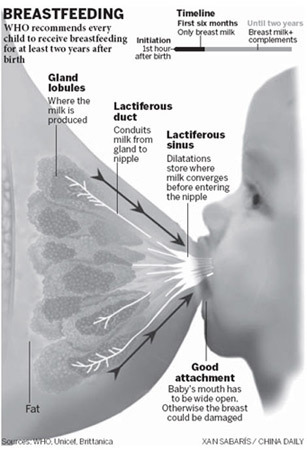Society
Women unaware of breastfeeding norms - poll
By He Dan (China Daily)
Updated: 2010-08-07 11:17
 |
Large Medium Small |

BEIJING - A poll of more than 1,100 people in seven cities nationwide revealed that only 20 percent of respondents understood what exclusive breastfeeding means while more than 50 percent of mothers stopped exclusive breastfeeding before their child was 6 months old.
The survey, conducted by Beijing Horizon Research Consultancy Group for Save the Children China Program, was released during this year's World Breastfeeding Week, lasting from Aug 1-7.
Exclusive breastfeeding is defined as giving only breast milk without any other food or drink, including water. Nonetheless, four in five respondents believed complementary water and food like milk power could be added during the course of feeding breast milk.
"Breast milk supplies sufficient and balanced nutrition for a baby within the first six months of life," Dai Yaohua, a doctor at Beijing-based Capital Institute of Pediatrics, said at a conference.
The World Health Organization (WHO) and China's Ministry of Health both suggested caregivers to add complementary food for infants when they are 6 months old and continue breastfeeding until they are 2 years old or more.
The poll also found that only 29 percent mothers exclusively breastfed their babies for six months, while more than half of the interviewees failed to do so.
Insufficient breast milk and having no time to continue breastfeeding after returning from work (31 percent) were cited as two major reasons young mothers were unable to exclusively breastfeed for 6 months.
According to the Labor Law of China, which went into effect in 2008, female employees are entitled to a paid maternity leave of at least 90 days. In addition, the Regulations on Labor Protection of Women Workers grant female employees more flexibility in work time if she has a child less than a year old.
However, in reality, work and breastfeeding at the same time does present considerable challenges for new mothers.
Based on another research conducted by the Wuhan Women's Federation this March, more than 60 percent of the female migrant workers did not receive paid maternity leave, while nearly one in four were laid off on occasions of marriage, pregnancy, child birth and breastfeeding.
"A lot of my colleagues just breastfed their children for about three months because we just have a 3.5-month maternity leave and there was no special room in our workplace for mothers to breastfeed or pump breast milk," said Liu Jingjing, a 31-year-old mother in Beijing.
"I quit my job after I found I got pregnant", she added, "because I want to have more time to be with my child."




